I first became vegan after watching the movie “Forks over Knives.” The movie’s main assertion is that all fats and animal products are bad, cancer causing and artery clogging, per Dr. Campbell. The main culprit though is the animal protein casein, which is the star topic in Campbell’s controversial book “The China Study.” There are many who find fault with Campbell’s assertions. Denise Minger of RawFoodSos, wrote a very extensive, impressive analysis of the faults of the china study here (source).
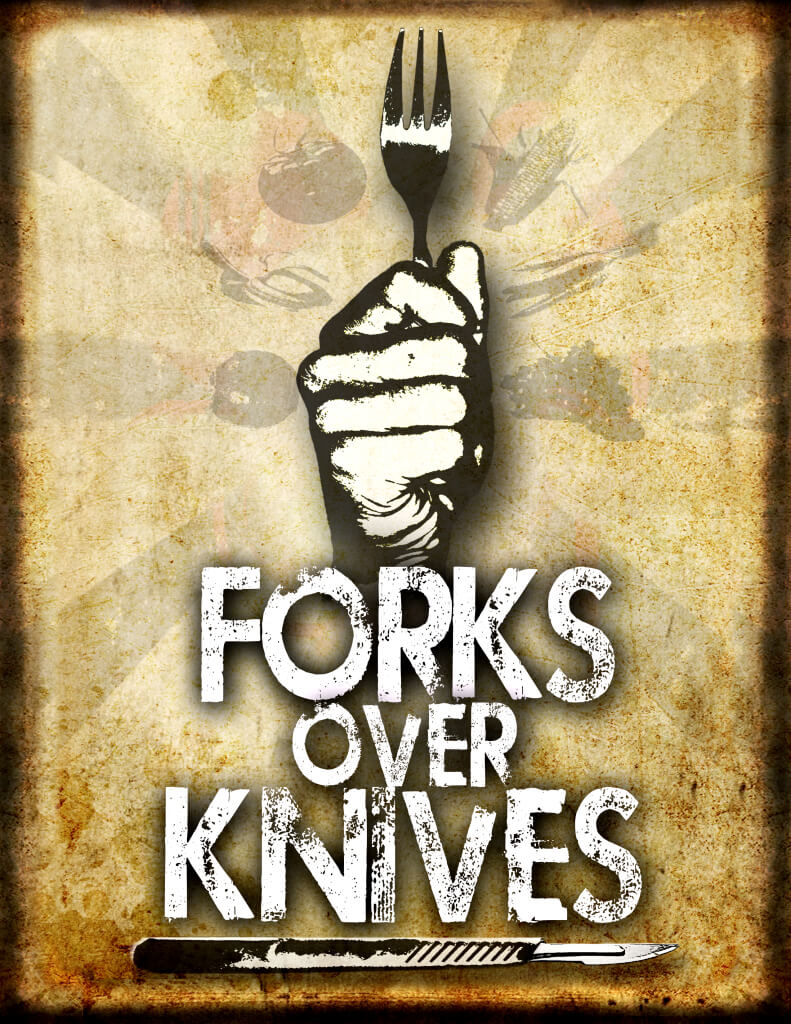
The other big thing with “Forks Over Knives,” and many others interested in health is cholesterol. Ohh yes, the dreaded artery clogging, cancer causing bane of your heart. But is it?
Denise Minger also did an excellent critique on Mark’s Daily Apple of studies that showed that cancerous tumor growth in mice increased with fat/cholesterol consumption.
So, easy right? Mice fed cholesterol, mice get cancer. Not so fast! The actual diet consisted of only 21% milkfat and 31% processed sugar.  Many studies have shown the link between excess sugar consumption and cancerous tumor growth (source). So, better pass up those Susan G. Komen sponsored sugar cookies.
Many studies have shown the link between excess sugar consumption and cancerous tumor growth (source). So, better pass up those Susan G. Komen sponsored sugar cookies.
The CDC reports that heart disease and cancer are the top causes of death in America. Alzheimers and diabetes are number 6 and 7 on the list. All of these can be caused or severely worsened by sugar consumption.
Americans love for sweets has skyrocketed over the years.
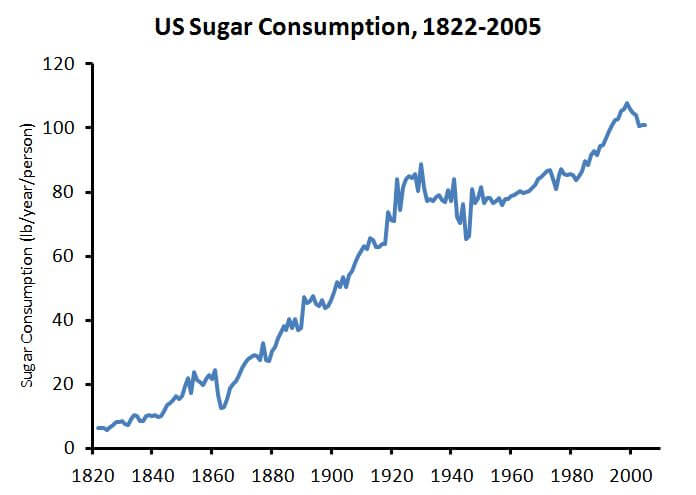 |
| Source
Refined corn sweeteners like high fructose corn syrup went from 11 pounds in the 1950’s to 85.3 in 2000.
|
Another huge fault with the “Forks Over Knives” movie is that sugar was not factored into the presented evidence.
Everyone can agree that processed sugar isn’t good for you, but when it comes to heart disease people turn a blind (or unknowing) eye. A Harvard study found that artherosclerosis actually decreased with saturated fat consumption (source)
Everyone knows that saturated fat causes cholesterol, which in turn causes heart disease, right? How many times have you seen this assertion from “reliable” sources, especially doctors, with no cited studies to back it up. This meta-analysis published in the American Journal of Clinical Nutrition reviewed 21 studies that explored the idea that decreased saturated fat consumption conversely improves cardiovascular health.
“There is no significant evidence for concluding that dietary saturated fat is associated with an increased risk of CHD (coronary heart disease) or CVD (cardiovascular disease). More data are needed to elucidate whether CVD risks are likely to be influenced by the specific nutrients used to replace saturated fat.”
Everyone “knew” that the earth was flat too. This meta-analysis also speculated that CVD could be caused by saturated fat substitutes. Margarine anyone?
Stephen Guyenet, a researcher at the University of Washington analyzed dozens of studies that attempted to associate saturated fat consumption with heart disease. Although saturated fat did raise cholesterol levels overall (primarily the good HDL), the studies showed that there was no connection with an increase of heart disease.
The Framingham study conducted by Harvard is considered to be the longest running, most comprehensive study on the effects of saturated fats as related to heart disease. It’s often cited by other researchers. However,
“When investigators analyzed the relationship between saturated fat intake, serum cholesterol and heart attack risk, they were so disappointed that they never formally published the results.” (source)
The study, which still continues today, has shown no significant connection between saturated fat consumption and heart disease.
Not only has sugar caused heart disease numbers to rise in recent years, but another culprit is low vitamin D levels.
Vitamin D is necessary to manage cholesterol levels in the body. Without it, the cholesterol oxidizes and is absorbed by white blood cells to form heart disease causing “foam cells” (source).
So where can we get vitamin D? Sunshine is a big one, but it’s hard to get enough, especially in the winter.
Saturated fats from quality sources, pasture raised, grass fed meat and raw dairy are naturally high in Vitamin D. Fermented cod liver oil is considered to be the best source at 1,360 IU per tablespoon. Salmon, tuna, liver and eggs are also high sources.
But what about non-animal sources? Surely there are plants that can provide sufficient levels of vitamin D.
This chart lists the USDA’s top dietary sources of vitamin D. The only non-animal sources are products that have synthetic vitamin D added to them. White pasteurized milk fortified with vitamin D is also included, however raw milk has a much higher nutritional content and naturally occurring vitamin D (source). Other sources include fortified breakfast cereal with processed grains and too often sugar.
Mushrooms are the one exception as they do contain some vitamin D.
 |
| source |
Ain’t nobody got time for that.
“Eating foods that increase inflammation within the body such as refined carbohydrates and super-heated fats – especially those fragile polyunsaturated fatty acids – coupled with vitamin D insufficiency sets up a feedback loop within the body that increases your risk of high cholesterol, heart disease and death from heart-related problems”source).
This CDC graph shows average total cholesterol levels from 1959 to 2008. As you can see, the average cholesterol has plummeted to below the healthy target of 200 milligrams daily.
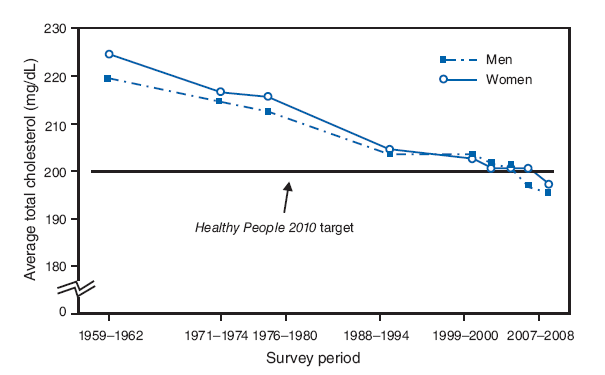 |
| source
This graph from the American Heart Association shows that the deaths from heart disease have steadily increased the past 100 years. |
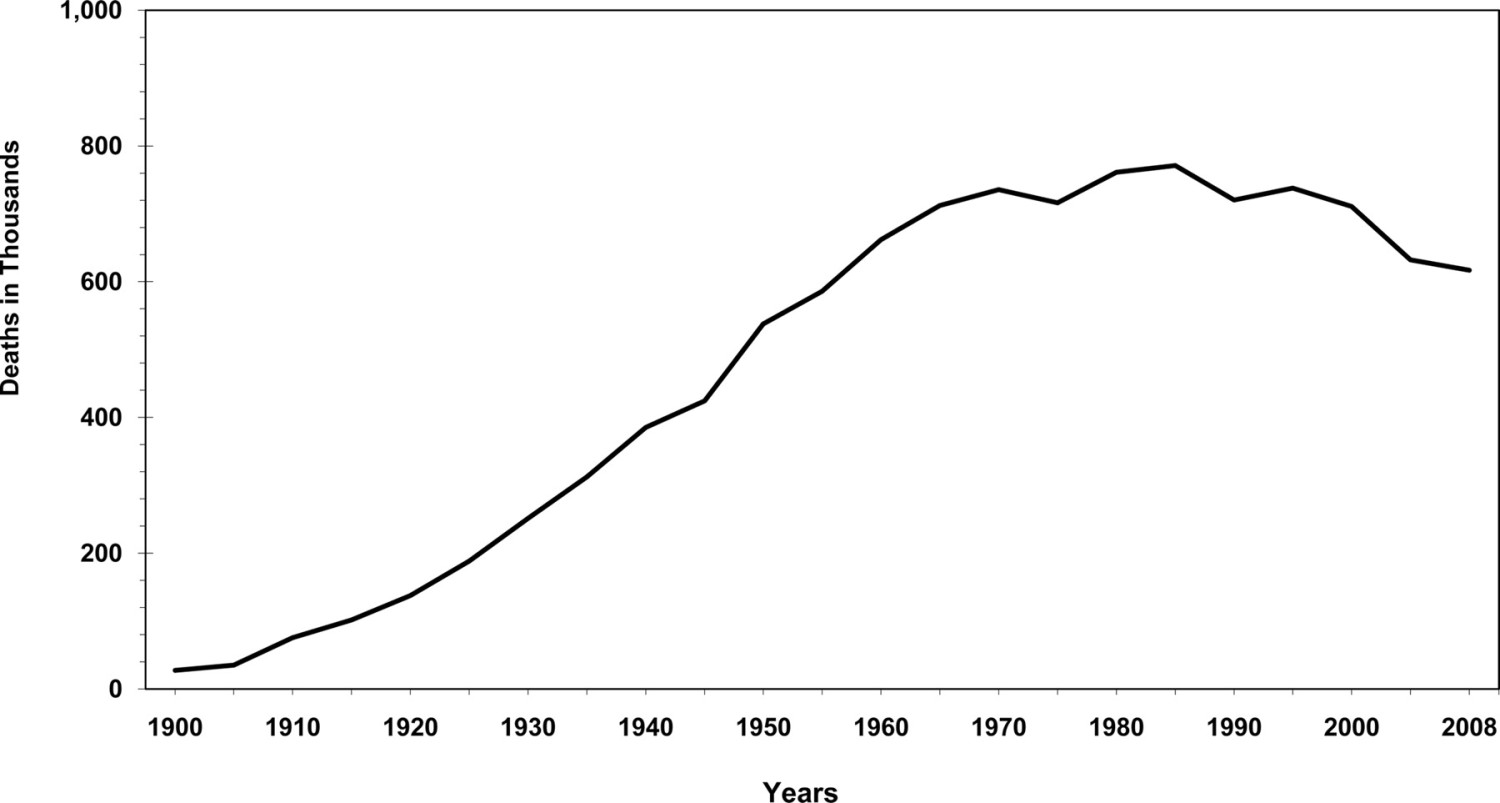 |
| source Let’s compare these with the sugar consumption graph above. |
Eating fat and cholesterol from pasture raised, non-gmo animal sources doesn’t cause heart disease. Processed and sugary foods are much more detrimental to heart health.
There are numerous benefits to pasture raised animal products and avoiding them for the sake of cholesterol is a poor argument in my opinion.
There are ethical concerns when it comes to animal products, and I also believe that in excess they can cause problems. But that’s for the next post 🙂
Additional Sources:
The Benefits of High Cholesterol – Weston a. Price Foundation
Why I’m Never Going To Get My Cholesterol Levels Checked Again – Emily Benefit on Dr. Natasha MD
Red Meat is Part of a Healthy Diet – Dr. Richard Maurer
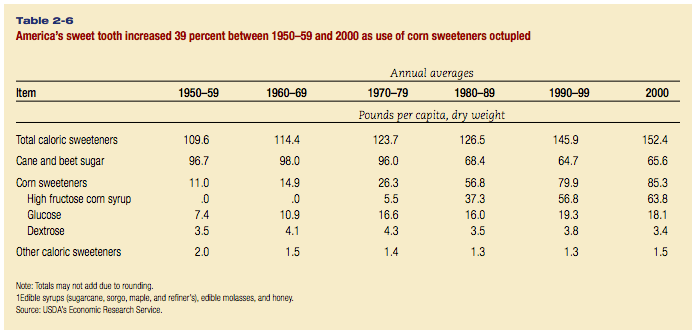

Hello, I really enjoyed this post. Thanks for giving amazing information with graphs and everything! I enjoy thoroughly researched material. I have mentioned your post on my facebook page. I hope you do not mind. 🙂 Thanks for a good read!
Glad to help 🙂 I too enjoy reading well researched pieces, so I like to provide the same service to my readers. And any mentions (with proper accreditation) are greatly appreciated!
My daughters have been talking about becoming vegan. This post is exactly why I have been discouraging them. And, yes, they eat WAY too much sugar. Mostly in the form of sugary products like jam…
You may want to show them this article, and the second one in my “no longer vegan” series. A friend of mine became vegan, uses LOTS of supplements to make up for the nutritional deficiencies and now looks much older and unhealthy. She has since had cancer and several severe illnesses.
http://howtojustaboutanything.blogspot.com/2013/12/vegan-healthy-foods-that-are-anything.html
I love converted vegans! Kudos to you for doing some good research!
So, how long were did you eat a vegan diet for?
I was vegan for roughly a year before my body couldn’t take the nutritional deficiencies anymore. I came out of it with adrenal fatigue and a thyroid problem. Unfortunately I was also pregnant/nursing at the time, so my son has bone deformities because of my vegan diet.
Now we drink lots of raw milk and eat pastured meat a few times a week.